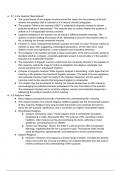● 8.1 Is the Question Meaningless?
● The central theme of this chapter revolves around the inquiry into the meaning of life and
whether the question itself is coherent or if it harbors inherent ambiguities.
● The question "What is the meaning of life?" is subjected to linguistic analysis to discern
potential variations in interpretation. This analysis aims to unravel whether the question is
uniform or if it encapsulates diverse concerns.
● Linguistic ambiguity in the question can be traced to different possible meanings. The
question could be seeking the purpose of life, attempting to uncover what imparts value to
life, or delving into broader existential inquiries.
● Purpose vs. Value: Distinguishing between purpose and value is crucial. Purpose implies an
intention or goal, often suggesting a teleological perspective. On the other hand, value
relates to worth and significance, a more subjective and evaluative dimension.
● The ambiguity in the question prompts a closer examination of the terms involved, aiming to
elucidate whether a singular, universally applicable answer is conceivable or if the question
branches into multifaceted inquiries.
● The exploration of linguistic nuances underscores the complexity inherent in the question of
life's meaning, setting the stage for further investigation into religious, existential, and
secular perspectives in subsequent chapters.
● Critiques of Linguistic Analysis: While linguistic analysis is illuminating, critics argue that the
meaning of life question may transcend linguistic precision. The depth of human experience
and existential inquiries might not neatly fit into linguistic categories, and the quest for
meaning could involve aspects that language struggles to encapsulate.
● This chapter lays the groundwork for delving into diverse perspectives on life's meaning,
acknowledging the potential intricacies embedded in the very formulation of the question.
The subsequent chapters aim to scrutinize religious, secular, and existential viewpoints in
addressing the profound question of life's meaning.
● 8.2 Religious Views
● Many religious perspectives provide a framework for understanding life's meaning.
● This chapter explores how various religious traditions grapple with the fundamental question
of life's meaning. Religions have long provided frameworks and narratives that seek to
imbue life with purpose, significance, and a connection to a higher, transcendent reality.
● Monotheistic Religions:
■ Judaism, Christianity, Islam: These religions share a monotheistic foundation,
emphasizing a single, all-powerful deity. The purpose of life, according to these
traditions, often involves serving and worshiping the divine, adhering to moral
guidelines, and preparing for an afterlife.
■ Theism and Teleology: Theism, the belief in a personal God, often incorporates
teleology, suggesting that life has a purpose or goal. The purpose might include
moral development, spiritual growth, and adherence to divine commandments.
● Eastern Religions:
■ Hinduism: Hinduism encompasses a diverse range of beliefs. Concepts like dharma
(duty), karma (the law of cause and effect), and moksha (liberation from the cycle of
rebirth) contribute to the understanding of life's purpose.
, ■ Buddhism: Buddhism, while diverse in its interpretations, generally sees the quest for
enlightenment and liberation from suffering as central. The Eightfold Path guides
adherents toward a meaningful life.
● Existential Critiques:
■ Existentialist Concerns: Existentialist thinkers, such as Jean-Paul Sartre, critique
religious frameworks, arguing that they might offer illusory comfort. Sartre, an atheist,
contends that religious meaning is a human invention, and individuals must confront
the existential void and create their own meaning.
● Challenges and Diversity:
■ Interreligious Diversity: While overarching themes exist, religious perspectives on the
meaning of life vary widely even within traditions. Interpretations depend on
theological nuances, sects, and individual beliefs.
■ Challenges to Religious Answers: Critics argue that religious answers, while
providing a sense of meaning, often raise philosophical challenges. The problem of
evil, divine hiddenness, and differing religious claims present complexities that
individuals grapple with.
● Synthesis and Individual Choice:
■ Synthesizing Perspectives: Some individuals draw from multiple religious traditions
or integrate religious insights with secular philosophies. This synthesis allows for a
more personalized understanding of life's meaning.
■ Individual Choice: Religious or spiritual meaning often involves a personal choice to
embrace particular beliefs and practices. This choice stems from an individual's
search for purpose and connection to the transcendent.
● Immortality: Life gains meaning through an afterlife, rewarding moral actions.
● Critiques include concerns about divine hiddenness and the problem of evil.
● 8.3 The Absurd
● Existentialist thinkers, like Albert Camus, propose the concept of the absurd.
● Absurdity arises from the clash between human desire for meaning and the apparent
meaninglessness of the universe.
● Absurdity can be resolved through revolt, freedom, and passion.
● This chapter explores secular and non-religious perspectives on the meaning of life. Secular
philosophies, often rooted in humanism and atheism, seek to address questions of purpose,
morality, and significance without relying on religious doctrines.
● Humanism and the Human-Centered Approach:
■ Humanist Principles: Humanism places emphasis on human values, ethics, and the
well-being of individuals and society. The humanist perspective asserts that meaning
and purpose can be derived from human experiences, relationships, and
contributions.
■ Naturalistic Worldview: Secular humanism often adopts a naturalistic worldview,
asserting that explanations for existence and meaning can be found within the
natural world and human capacities.
● Existentialist Perspectives:




